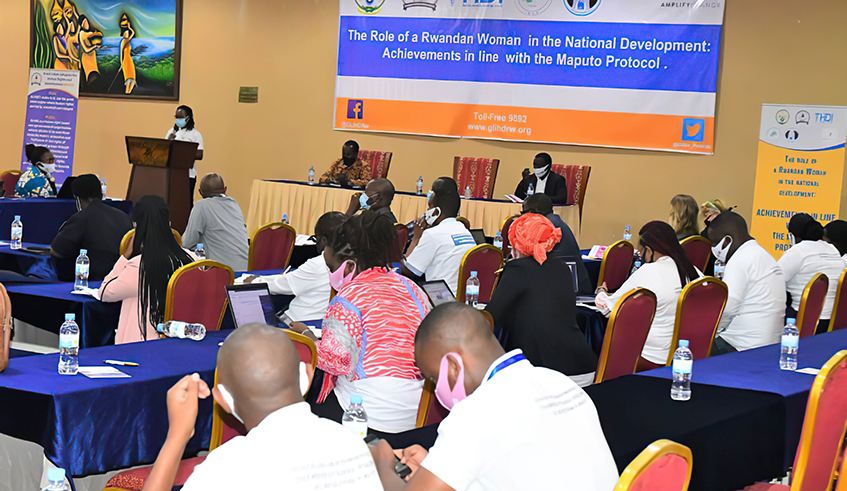

Seventeen years ago, the Protocol to the African Charter on Human and Peoples’ Rights on the Rights of Women in Africa, better known as the Maputo Protocol, was signed. It has been signed and ratified by 49 African nations including Rwanda.
Rwanda is among several African countries that have established implementation policies to observe women’s rights, including the lifting of reservation on Maputo Protocol’s article 14 about affirmation of the importance of women’s access to safe and legal abortion.
The latest World Economic Forum’s report placed Rwanda as the only African country among the top 10 nations in the world in gender parity with 62 per cent of the parliament being women.
However, concerns over implementation of policies and accessibility of reproductive health services were raised as major obstacles to observing women’s rights.
On Friday, July 10, key players in implementing and advocating for women’s rights policies gathered in Kigali to celebrate achievements, but also reflect on areas of improvement.
The event assembled Health Development Initiative, Great Lakes Initiative for Human Rights and Development, Ministry of Gender and Family Promotion and other non-government organizations concerned.
Access to sexual and reproductive health needs extra effort
Article 14 of Maputo Protocol stipulates that every woman has the right to access sexual and reproductive health services.
Currently, health services to young girls in Rwanda are only provided when there is parental consent, some of whom still have a difficult time opening up to sexual health conversations.
According to Dr Aflodis Kagaba, Executive Director and co-founder of Health Development Initiative (HDI) Rwanda, parents, health practitioners, policy makers and women themselves are still unwilling and resistant when it comes to sexual and reproductive conversations. This unwillingness among health care providers and policy makers encourages the practice of stigma and insufficiency of friendly services.
His argument was reiterated by the Minister of Gender and Family Promotion, Prof. Jeannette Bayisenge, who sees the lack of information that is brought about by culture-based mindsets, as a critical obstacle in implementing women’s rights policies.
As a result, women tend to make uninformed decisions, they are faced with unexpected pregnancies and miss out on opportunities and rights reserved for them.
Minister Bayisenge added that Rwanda excels in initiating policies for women’s rights but the issue arises with implementation.
"Implementation is the hardest part because it deals with people’s mindset and biases. It is not an overnight process. Given the current effort, it will take time, but changes are already happening,” she said.
Way forward
Dr Aflodis Kagaba said that at HDI, extended comprehensive sexual education for not only girls and women, but also boys and men, is one of the most sustainable solutions to ensure positive change.
There is also a need to raise awareness on the existing policies and laws so that women can easily claim their rights.
Age-based restrictions should not prevent adolescents from making decisions about their sexual and reproductive lives but access their full range of reproductive health information and services.
"Ten years ago, it was rare for people to gather and discuss topics like abortion. But today, it is an open debate because people are starting to understand. All we need to do is keep educating. I am hopeful that it is only a matter of time until Rwandans are fully comfortable discussing their sexual reproductive health and rights.”
In addition, the initiative advocates for policy changes and their implementation to concerned authorities in order to reverse the current reality in observing women’s rights.
Such strategies in addition to easing availability, affordability and accessibility of sexual and reproductive health products and services, are among recommendations that were given at the event.


